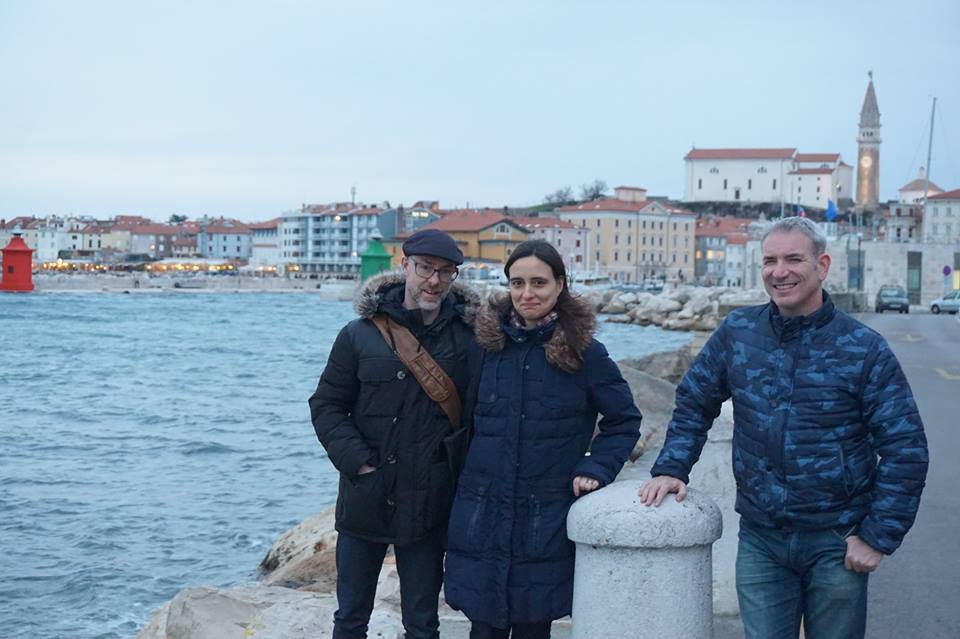‘Advance. Inspire. Teach’: Portoroz, Slovenia

‘Advance. Inspire. Teach’: Portoroz, Slovenia
Review by Adam Simpson
The ‘Advance. Inspire. Teach’ conference took place on 5th March in Portoroz, Slovenia. With a theme encompassing the need for innovative thinking in language teaching, the event consisted of five plenary talks, followed by workshops from each of the speakers.
Fiona Mauchline on personalization
Coursebooks have moved away from the ‘describe your house/last holiday' style of years gone by, as content, culture and critical thinking take pole position, noted Fiona Mauchline in the opening plenary.
This practical talk, entitled ‘Personalising the classroom: 'me' is for 'memorable'’, looked at what 'personalization' really means, and how to go about it in the coursebook-based classroom, putting the ‘Me’ back into memorable, meaningful lessons for teens and adults alike. This may be a more challenging approach, but without personalization, Fiona suggested, it all comes to nothing.
Adam Simpson on Generation Z learners
The School of Languages was represented by Adam Simpson, who delivered a talk entitled ‘Engaging Generation Z in the Language Classroom with Technology.’ English teachers working with young learners recognize that such learners think and behave differently than those from previous generations. Welcome to Generation Z! These students were born into a world of information technology; they regularly multitask… and they trust the ideas of peers and web videos more than their teachers. Generation Z is significant, noted Adam: it constitutes about a quarter of the world’s population. As this Post-Millennial group occupies the youngest end of the population demographic, we can assume many second language learners belong to this group; it therefore demands our attention and understanding.
Adam highlighted the fact that contemporary research on Generation Z has originated in developed nations, although further examination is increasing throughout the world. Whereas Generation Z has received much attention in the academic literature of many fields, this is not yet the case in ELT research. This lack of consideration is regrettable, as most Gen-Zers are currently English language learners. His talk attempted to address this shortcoming by examining the nature of Gen-Z, and then drawing ideas from the literature to present a series of ‘commandments’ for teaching this age group effectively with the use of classroom technology.
Tom Majer on the need for change
If innovation is about change, and teachers are educational change agents, therefore we can conclude that teachers are educational innovation agents, suggested Tom Majer in his plenary. Innovation requires us to think and reflect, and at the same time we need to acknowledge the passion that drives this feeling. The feeling/passion component that drives innovation and inspiration needs to be at the forefront with thinking.
What do we need to do to develop this complementary component in creating and innovating? Tom’s theoretical talk, entitled ‘Change is a good thing!?’ looked at how we feel about change and what we can do to inspire your learners along an innovative educative path.
Paul Driver on the future trends in Ed Tech
Paul Driver’s talk, entitled ‘What’s in? What’s out? What’s next?’, explored the recent trends and developments in the use of learning technologies in the context of English language teaching. As a starting point, Paul discussed how the ways in which we interact with technology and communicate with each other through technology have changed, and the implications of these shifts for lesson and materials design.
Paul then provided examples of three key technologies that he has applied, both in and out of the classroom, to develop writing, listening, reading and speaking skills. The first of these was digital games, which, despite their increasing popularity as learning tools, remain poorly understood and underexploited. Next, he delved into the world of digital video, exploring this theme from the perspectives of both creation and consumption. The final part of Paul’s talk focused on the experimental application of augmented reality (the real-time superimposition of digital media over real-world physical environments), concluding with a look at current trends that will shape the future of ELT.
Simon Borg on professional development
In the concluding talk, entitled ‘Professional development in the classroom’, Simon Borg discussed school-based approaches to professional development that teachers can engage in both inside their classrooms and with their colleagues. There is much evidence that such approaches can be very beneficial for teachers, students and schools, he suggested.
For many teachers, Simon noted, professional development means some time away from school – for example at a conference, seminar or a workshop. While such off-site events are a useful form of learning for teachers, they do not take place very often. He pertinently raised the question: does this mean then that, if a teacher attends a conference or seminar once or twice a year, that is the only time that professional development can take place? Additionally, he put forward the idea that professional development based on attending an event somewhere creates a distinction between teaching (which takes place at school) and teacher learning (that takes place away from school), which is, he argued, unhelpful.
